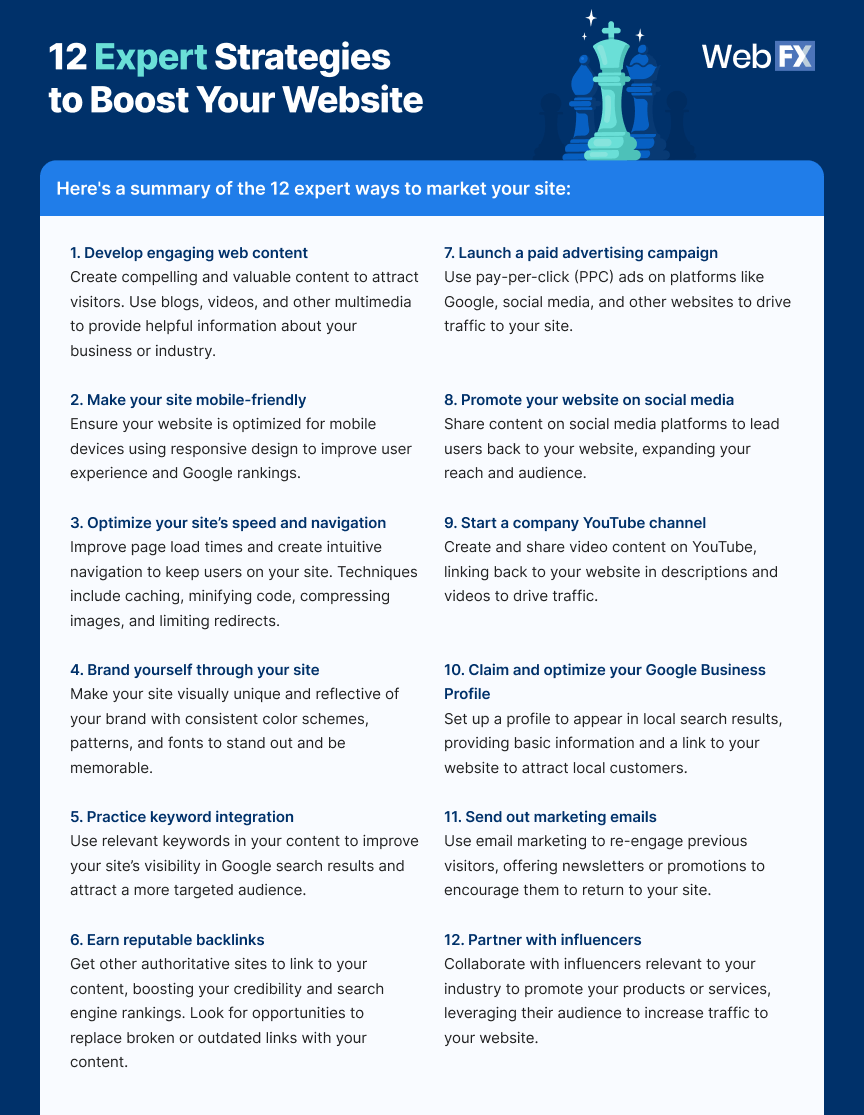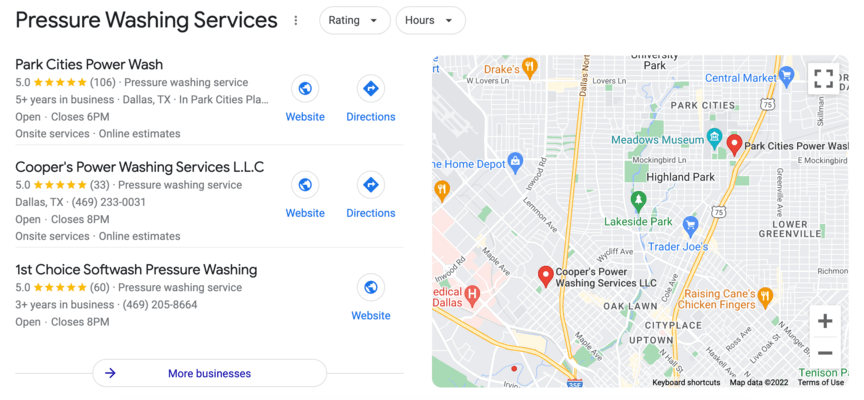Looking to drive more revenue from your site? Get website marketing.
What is website marketing? Website marketing is the use of digital marketing strategies, like search engine optimization (SEO) and pay-per-click (PPC) advertising, to improve a site’s traffic and revenue.
Keep reading to learn more about website marketing, including:
- What is website marketing?
- Why is website marketing important?
- 15 expert ways to market your site
- 5 website marketing tools to use
- Website marketing FAQ
Then subscribe to Revenue Weekly — our email newsletter — to receive more digital marketing tips from the agency with over 1,100 client testimonials!
What is website marketing?
Website marketing is the use of marketing strategies, like search engine optimization (SEO) and conversion rate optimization (CRO), to improve a site’s traffic, engagement levels, and conversion rate.
Why is website marketing important?
Summer is struggling. She’s put in countless hours setting up a website for her business, but still, hardly anyone is visiting it. What, she wonders, could possibly be the issue? What Summer will eventually figure out, though, is that she needs to market her website online.
The same is true for your business. Your site is where top-of-funnel users can learn the most about you, and where bottom-of-funnel users can convert. So, naturally, it’s where you want all your potential customers to go.
To bring in web traffic, though, you must market your site.
15 expert ways to market your site
If you’re unsure how to go about promoting your website, don’t worry — there are many different tactics you can try, most of them relating to web design and search engine optimization.
Here are 15 methods for online website marketing:
- Develop engaging web content
- Make your site mobile-friendly
- Optimize your site’s speed and navigation
- Brand yourself through your site
- Practice keyword integration
- Earn reputable backlinks
- Launch a paid advertising campaign
- Promote your website on social media
- Start a company YouTube channel
- Claim and optimize your Google Business Profile
- Send out marketing emails
- Partner with influencers
- Launch an affiliate marketing program
- Encourage customers to leave reviews
- Run an omnichannel marketing campaign
You can read a quick summary of each one here:

Read on to learn about each strategy in more detail!
1. Develop engaging web content
One of the best things you can do to market your site is to fill it with compelling content. Content is what gives your site value for users — if you don’t have anything to offer prospects, you won’t give them a reason to visit your website.
Your content can take various forms. Much of it should be written — for instance, a blog is a fantastic tool for attracting traffic. But you can also harness multimedia like videos.
Regardless of format, all your content should focus on providing users with helpful information about your business or industry. If you’re a financial consultant, you might offer a list of basic money-managing tips. Or if you’re a restaurant, you might post a few of your recipes.
Whatever the case, your goal is to draw in users who are interested in learning from you.
2. Make your site mobile-friendly
There was a time when you could only access the Internet via desktop computers, but that time is long past. Today, most users use mobile devices to visit websites. In fact, Google uses a mobile-first index, meaning it ranks sites based on their mobile format.
For that reason, it’s vital for you to create a mobile-friendly website. The best way to make your website function well on mobile is to use responsive design. Responsive design is a form of web design that causes your site to automatically restructure its pages to fit the screen where they appear.
Here’s an example of a site on desktop:

And the mobile version:

With a mobile-friendly site, you’ll rank higher in Google and retain the incoming mobile traffic to your website.
3. Optimize your site’s speed and navigation
When users visit your website, they shouldn’t encounter any problems using it, especially when loading content. Your pages should load quickly, so users get the information they need. If they don’t, most users will only end up hitting the “back” button.
To that end, be sure to optimize your page speeds by:
- Caching web pages
- Minifying code
- Compressing images
- Limiting redirects
Additionally, users should easily find their way around your site. For that to happen, you’ll need to create an intuitive navigation setup. Organize your pages in a logical way and display them in a navigation bar at the top of the page.
4. Brand yourself through your site
One of the worst things you could do for your website marketing is to make your site look like all the others in your industry. If you want people to visit your website, it needs to stand out — and the best way to do that is through branding.
Your visual design should reflect the identity you want to associate with your business. If you have a particular color scheme you tend to use, include it across your site. Likewise, use shape patterns and font styles that reflect your brand.
The result of your branding is that you create a unique website that stands out in users’ minds. That will help them remember your site above your competitors’, leading them to come back for another site visit later.
5. Practice keyword integration
Arguably the best way to get your website in front of users is to rank in Google search results. But not just any search results — you need your site to appear in searches that are relevant to your business.
To help communicate to Google which searches your content should rank for, try inserting relevant keywords. For instance, let’s say you write a blog post about how to troubleshoot the sound on your laptop. You could include a term like “laptop sound not working” to help it rank for that keyword.
By targeting relevant queries, you’ll reach a more receptive audience and earn more traffic!
6. Earn reputable backlinks
Another way to improve your website promotion is to earn backlinks to your content. Backlinks are where third-party websites link to your site in their content.
To be more specific, you want reputable backlinks from authoritative sites. When Google sees reputable sites linking to you, it will assume you’re reputable as well. As a result, it will rank you higher in search results.
To earn backlinks, simply go through content on reputable websites in your industry and look for broken or outdated links. Then recommend to the site owners that they replace the links with new ones by providing a list of pages to link to, including links to your content.
Backlinks can also help new audiences find your site. If someone is reading an article that links to your site, they might follow the link and become interested in what you offer.
7. Launch a paid advertising campaign
Our next tip for promoting your website is to use paid advertising. You can display paid ads in various places across the Internet, including:
- At the top of Google search results
- In the margins of third-party websites
- In social media users’ feeds
- In the “Promotions” tab of users’ Gmail inboxes
- And more!
Most of these paid ads are pay-per-click, meaning you only pay for them when users click on them. The ads lead users to landing pages that encourage them to visit a particular site or take action.
You can use those landing pages to direct users to your website, where they can learn more about you and ultimately convert into customers!
8. Promote your website on social media
Easily one of the best places online to reach your target audience is social media. That’s true no matter who your audience is — even if you market to businesses, decision-makers at those businesses will still be on social media.
So, how does this relate to your website? Simple — when you post content on your social media pages, you can use it to lead users back to your site. For example, you might make a post promoting your latest blog post, with a link leading back to it.
The same goes for other types of social media content. Case studies, contests, industry news — you can use all of things to link users back to your website. That means your target audience can discover you on social media, and then progress to your site from there.
9. Start a company YouTube channel
Technically, YouTube qualifies as a social media channel. However, when you use it for marketing, it’s pretty much its own thing. YouTube is a great resource for your video marketing strategy. You can post helpful video content there in the same way you post articles on your website.
Just like with standard social media platforms, you can then use your YouTube channel to direct users to your website. To start with, you can include links to your site in your channel description, as well as the descriptions for your individual videos. You can also mention in the videos themselves that viewers should check out your website.
10. Claim and optimize your Google Business Profile
You can also bring more people to your site by creating a Google Business Profile. If you don’t know what that is based on the name, you’ve still probably seen it before. Have you ever searched for a particular type of business in your area and seen a search result that looks like this?

That’s called a local 3-pack. As you can see, there are three businesses shown there, and each of those is a Google Business Profile. These profiles contain basic information about the businesses they represent, including their location and hours of operation.
You can set up a Google Business Profile for your company as well — and in fact, you should. That allows you to rank more effectively in Google searches for businesses in your area. Google Business Profiles typically include a link to the company’s website, so by including that in your own profile, you’ll lead more people to your site.
11. Send out marketing emails
Email marketing is another common digital marketing strategy, which involves sending out emails to people and encouraging them to become customers.
Of course, for people to be subscribed to your email list to begin with, they must have visited your site already. That means that in the context of website marketing, email is a remarketing strategy.
The goal is to reach people who visited your site before and then left, encouraging them to come back. The content of your emails might be more informational (like a newsletter), or it might be more salesy, directly promoting specific products or services.
12. Partner with influencers
A quick caveat right off the bat: Influencer marketing isn’t for everyone. Depending on what you sell, you may not be able to find any relevant influencers. Or, even if you do, they might not be worth the investment. However, some industries find influencing to be a useful strategy.
If you don’t know much about influencing, it’s basically where you pay people with large followings online to promote your products or services. For example, if you sell tech products, you could find someone who runs a YouTube channel where they talk about tech, and you could offer them something in return for showing off your latest product.
The goal is for people who follow those influencers to become interested in your business and visit your website, and it works great for some companies.
13. Launch an affiliate marketing program
Affiliate marketing is a system where other people or businesses promote your company in return for a percentage of the resulting profits. It’s a great way to market your website online.
As an example, let’s say you’re a vet clinic. You might partner with a local animal shelter, where they promote your clinic on their website. You then track all of the sales that result from that promotion, and the animal shelter gets a cut of each one.
It’s a great way to market yourself without having to do any of the work yourself. You let someone else market your business — someone who has a monetary incentive to do it effectively — and then you watch the sales roll in. Yes, a portion of the revenue goes to the affiliate marketer, but it’s often worth the investment.
14. Encourage customers to leave reviews
When you promote your business directly, people might be willing to listen, but they’ll also take your opinion with a grain of salt. After all, of course you’re going to talk yourself up. But you know whose opinions people will trust fully? Your customers’. That’s why reviews are another great way to market your website.
When you earn new customers, you can encourage them to leave reviews for your products or services. They might leave those reviews on your Google Business Profile, on third-party sites like Amazon, or on local business listings. There are other options, too, depending on your industry.
In any case, when people see your customers singing your praises, they’re more likely to check out your website and become customers themselves.
15. Run an omnichannel marketing campaign
If you really want to improve the effectiveness of your website marketing, one of the best things you can do is run an omnichannel marketing campaign. That’s a type of campaign that spans multiple channels at once.
Keep in mind that we’re not talking about just running separate campaigns on separate channels. It’s all one campaign — the same messaging and branding across every platform.
The reason for this is that people often jump between different channels, especially with the lower attention spans we all have now. To truly reach them, you want them to see consistent messaging from your business on each channel they visit.
5 website marketing tools to use
Now that we’ve looked at the most effective strategies for marketing your website, let’s talk about some of the tools you can use to do that. There are countless website marketing tools out there, so we certainly can’t cover all of them, but we’ll go over a handful of the best ones, including:
Read on to learn more about each one!
1. Google Search Console
Google Search Console is a free tool offered by Google that lets you view analytics related to your performance in search results. You can see which pages are ranking for which keywords, how high they’re ranking, what their competitors are, and what kind of traffic they’re bringing in.
Given that this information is coming directly from Google rather than a third-party platform, you know it’s accurate. That’s excellent for helping you keep up with the success of your SEO campaigns.
2. Google Ads
Another Google tool you can take advantage of is Google Ads. Where Google Search Console just monitors your SEO performance, Google Ads is a platform you can use to actively run your paid ad campaigns. You can bid on the keywords you want to target and build the ads you want to display. You can even target specific locations, demographics, and more.
Like Google Search Console, Google Ads is technically free, although of course you have to pay for the ads you run. Thankfully, you only pay for them when people click on them, so it’s a very cost-effective platform.
3. Mailchimp
Mailchimp is an email marketing platform that helps you organize, automate, and analyze your marketing email campaigns. The base plan is free, but you can also upgrade to one of their paid plans, starting at $11 per month.
Using Mailchimp, you can more easily send out emails on a set schedule, and you can automate the process so you’re not having to send out every email manually. Plus, you can view reports on the results of your email campaigns so you can figure out what’s working and what’s not.
4. Buffer or Hootsuite
Buffer and Hootsuite are two competing tools, both of which can help you manage your social media marketing.
One of the main features they offer is the ability to schedule out posts in advance. So, you can write your posts when you have time, and then schedule them to go out at certain times in the future. That means you can consistently post on social media without necessarily having to carve out time to write new posts every day.
Buffer and Hootsuite can also help you monitor the success of your social campaigns, similar to what Mailchimp does with your email marketing. You can use that to figure out what to reoptimize going forward.
5. MarketingCloudFX
Finally, we have MarketingCloudFX (MCFX), our very own proprietary marketing software. MCFX is available exclusively to WebFX clients, so when you use it, you also get access to professional digital marketing services from WebFX experts.
MarketingCloudFX is an overall marketing platform, which means it can help you with a wide variety of digital marketing tasks. For one thing, it can help you monitor your campaigns across multiple channels, which is great for omnichannel marketing. It can also help you automate things like email marketing.
As if that wasn’t enough, MCFX users can get access to Nutshell CRM, which lets you track, organize, and analyze all your customer data in one centralized location. Honing your audience targeting with Nutshell and MCFX will do a lot to boost the success of your campaigns.
Website marketing FAQ
Check out the answers to some common website marketing questions below:
What is website marketing?
Website marketing is the process of using various strategies to increase traffic, engagement, and/or sales on a company’s website.
Does website marketing cost money?
How does website marketing work?
We foster and form long-term partnerships so that your business has long-term results.
Over 90%
of WebFX clients continue partnering with us into year 2 of their campaign.
WebFX can elevate your website promotion strategy
Need help promoting your website? WebFX has your back! With over 28 years of experience in the world of digital marketing, our website marketing company knows exactly what it takes to drive traffic to your website, and we can use our marketing expertise to make it happen.
When you partner with us for our digital marketing services, we’ll help you market your site using all the tactics above and more. We pride ourselves on being a “do-it-for-me” agency, meaning we’ll handle all the work of your campaigns while still giving you input into what we do.
To get started with us, just call 888-601-5359 or contact us online today!
 Matthew is a marketing expert focusing on the SEO & martech spaces. He has written over 500 marketing guides and video scripts for the WebFX YouTube channel. When he’s not striving to put out some fresh blog posts and articles, he’s usually fueling his Tolkien obsession or working on miscellaneous creative projects.
Matthew is a marketing expert focusing on the SEO & martech spaces. He has written over 500 marketing guides and video scripts for the WebFX YouTube channel. When he’s not striving to put out some fresh blog posts and articles, he’s usually fueling his Tolkien obsession or working on miscellaneous creative projects. WebFX is a full-service marketing agency with 1,100+ client reviews and a 4.9-star rating on Clutch! Find out how our expert team and revenue-accelerating tech can drive results for you! Learn more
WebFX is a full-service marketing agency with 1,100+ client reviews and a 4.9-star rating on Clutch! Find out how our expert team and revenue-accelerating tech can drive results for you! Learn more





